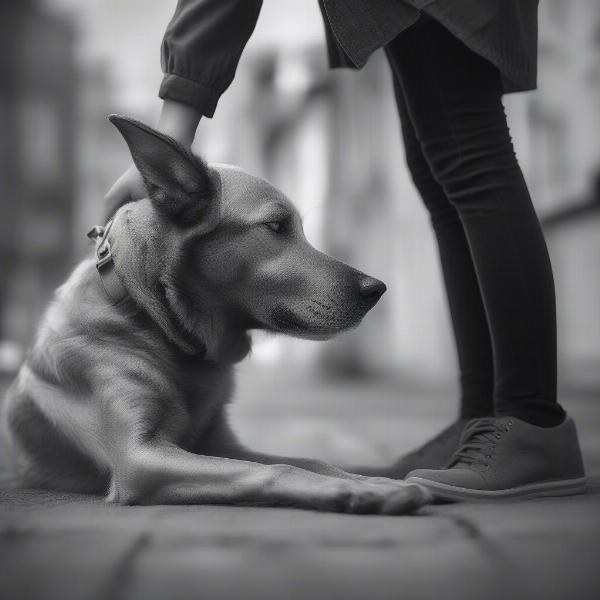Grey-coated dogs possess a unique elegance, ranging from the palest silver to deep charcoal. Whether you’re drawn to their distinguished appearance or simply curious about grey color dog breeds, this guide explores various breeds sporting this striking hue, delving into their temperaments, care requirements, and what makes them special.
Discovering the Diverse World of Grey Dogs
Grey isn’t just one shade; it’s a spectrum. From the shimmering blue-grey of the Weimaraner to the wolf-like grey of the Siberian Husky, these breeds showcase the diversity within this color family. Choosing a dog based on color is only one factor, though. Temperament, energy level, and grooming needs are crucial considerations when selecting your perfect canine companion.
Popular Grey Dog Breeds: An Overview
- Weimaraner: Known for their striking silver-grey coat and athletic build, Weimaraners are energetic dogs requiring plenty of exercise and mental stimulation. They are intelligent and loyal, forming strong bonds with their families.
- Siberian Husky: These majestic dogs with their thick grey and white coats were bred for sledding in harsh climates. Huskies are independent, energetic, and require experienced owners who can provide consistent training and socialization.
- Greyhound: Elegant and sleek, Greyhounds come in various shades of grey, often with white markings. While known for their incredible speed, they also enjoy lounging around and make surprisingly calm house companions.
- Great Dane: These gentle giants can also sport a grey coat, often with black or white markings. Great Danes are affectionate and loyal, but their large size requires careful consideration of space and resources.
Grey Coat Variations and Genetics
The grey color in dogs can result from various genetic factors. Some breeds, like the Weimaraner, have a dominant gene for grey, while others have more complex genetic combinations contributing to their grey coat. Understanding these genetics can be fascinating for breeders and enthusiasts alike.
Caring for Your Grey-Coated Canine
While the color of a dog’s coat doesn’t dictate its specific care needs, understanding the breed’s characteristics is crucial. Grey dogs, like all dogs, require proper nutrition, regular exercise, and grooming tailored to their coat type.
Grooming Tips for Grey Dogs
Some grey-coated breeds, like Huskies, have thick double coats requiring regular brushing to prevent matting and shedding. Shorter-coated breeds, like Greyhounds, require less frequent grooming. Regardless of coat type, regular nail trims, dental care, and occasional baths are essential.
Health Considerations for Grey Breeds
While grey isn’t inherently linked to specific health issues, each breed has its predispositions. For example, Great Danes are prone to bloat, while Greyhounds can be sensitive to certain medications. Regular veterinary checkups and breed-specific health screenings are vital for ensuring your grey companion’s well-being.
Finding the Right Grey Dog Breed for You
Choosing a dog is a significant decision. Researching breeds thoroughly, considering your lifestyle and experience, and meeting potential dogs are crucial steps. If you’re captivated by the elegance of grey dogs, explore the breeds mentioned and discover if their personalities and needs align with yours.
Questions to Ask Before Getting a Grey Dog
- What is the breed’s energy level? Can you provide adequate exercise and mental stimulation?
- What are the breed’s grooming requirements? Are you prepared for the time commitment?
- What are the breed’s common health concerns? Are you prepared for potential veterinary expenses?
 Grey Dog Playing with Owner
Grey Dog Playing with Owner
Conclusion
Grey color dog breeds offer a captivating blend of beauty and individuality. From the athletic Weimaraner to the gentle giant Great Dane, each breed boasts unique characteristics. By carefully considering your lifestyle and the specific needs of each breed, you can find the perfect grey-coated companion to enrich your life.
FAQ
- Are grey dogs more prone to specific health problems? No, the grey coat color itself doesn’t indicate any specific health issues. However, each breed has its own set of predispositions.
- Do all grey dogs have the same temperament? No, temperament varies greatly between breeds, regardless of coat color.
- Are grey dogs harder to groom than dogs with other coat colors? Not necessarily. Grooming depends on the coat type, not the color.
- Where can I find reputable breeders of grey dog breeds? Breed-specific rescue organizations and reputable breeders listed with kennel clubs are good starting points.
- Are grey dogs good with children? This depends on the breed and individual dog. Some grey breeds are known to be good with children, while others may be better suited to homes with older children or no children at all.
ILM Dog is your trusted source for comprehensive information on dog breeds, care, and well-being. We offer expert advice on everything from choosing the right breed to ensuring your dog’s health and happiness. For further assistance in selecting your perfect canine companion or for any dog-related queries, contact our team of experts. Email: [email protected], Phone: +44 20-3965-8624. Visit ILM Dog for more valuable insights and resources to enhance your dog ownership journey.